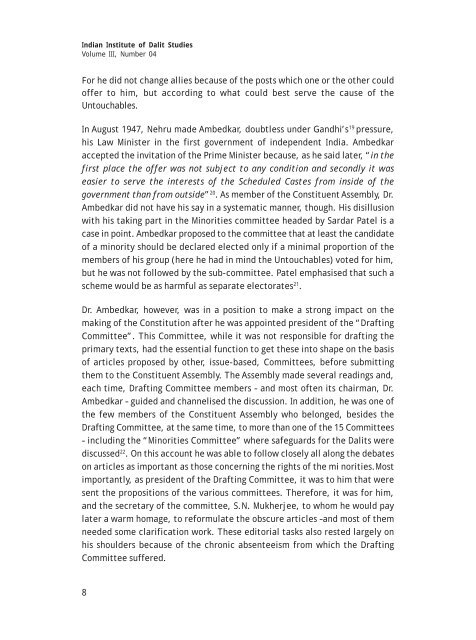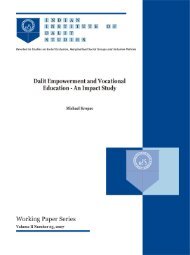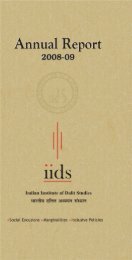Dr. Ambedkar's Strategies Against Untouchability and the Caste
Dr. Ambedkar's Strategies Against Untouchability and the Caste
Dr. Ambedkar's Strategies Against Untouchability and the Caste
Create successful ePaper yourself
Turn your PDF publications into a flip-book with our unique Google optimized e-Paper software.
Indian Institute of Dalit Studies<br />
Volume III, Number 04<br />
For he did not change allies because of <strong>the</strong> posts which one or <strong>the</strong> o<strong>the</strong>r could<br />
offer to him, but according to what could best serve <strong>the</strong> cause of <strong>the</strong><br />
Untouchables.<br />
In August 1947, Nehru made Ambedkar, doubtless under G<strong>and</strong>hi’s 19 pressure,<br />
his Law Minister in <strong>the</strong> first government of independent India. Ambedkar<br />
accepted <strong>the</strong> invitation of <strong>the</strong> Prime Minister because, as he said later, “in <strong>the</strong><br />
first place <strong>the</strong> offer was not subject to any condition <strong>and</strong> secondly it was<br />
easier to serve <strong>the</strong> interests of <strong>the</strong> Scheduled <strong>Caste</strong>s from inside of <strong>the</strong><br />
government than from outside” 20 . As member of <strong>the</strong> Constituent Assembly, <strong>Dr</strong>.<br />
Ambedkar did not have his say in a systematic manner, though. His disillusion<br />
with his taking part in <strong>the</strong> Minorities committee headed by Sardar Patel is a<br />
case in point. Ambedkar proposed to <strong>the</strong> committee that at least <strong>the</strong> c<strong>and</strong>idate<br />
of a minority should be declared elected only if a minimal proportion of <strong>the</strong><br />
members of his group (here he had in mind <strong>the</strong> Untouchables) voted for him,<br />
but he was not followed by <strong>the</strong> sub-committee. Patel emphasised that such a<br />
scheme would be as harmful as separate electorates 21 .<br />
<strong>Dr</strong>. Ambedkar, however, was in a position to make a strong impact on <strong>the</strong><br />
making of <strong>the</strong> Constitution after he was appointed president of <strong>the</strong> “<strong>Dr</strong>afting<br />
Committee”. This Committee, while it was not responsible for drafting <strong>the</strong><br />
primary texts, had <strong>the</strong> essential function to get <strong>the</strong>se into shape on <strong>the</strong> basis<br />
of articles proposed by o<strong>the</strong>r, issue-based, Committees, before submitting<br />
<strong>the</strong>m to <strong>the</strong> Constituent Assembly. The Assembly made several readings <strong>and</strong>,<br />
each time, <strong>Dr</strong>afting Committee members – <strong>and</strong> most often its chairman, <strong>Dr</strong>.<br />
Ambedkar – guided <strong>and</strong> channelised <strong>the</strong> discussion. In addition, he was one of<br />
<strong>the</strong> few members of <strong>the</strong> Constituent Assembly who belonged, besides <strong>the</strong><br />
<strong>Dr</strong>afting Committee, at <strong>the</strong> same time, to more than one of <strong>the</strong> 15 Committees<br />
– including <strong>the</strong> “Minorities Committee” where safeguards for <strong>the</strong> Dalits were<br />
discussed 22 . On this account he was able to follow closely all along <strong>the</strong> debates<br />
on articles as important as those concerning <strong>the</strong> rights of <strong>the</strong> mi norities.Most<br />
importantly, as president of <strong>the</strong> <strong>Dr</strong>afting Committee, it was to him that were<br />
sent <strong>the</strong> propositions of <strong>the</strong> various committees. Therefore, it was for him,<br />
<strong>and</strong> <strong>the</strong> secretary of <strong>the</strong> committee, S.N. Mukherjee, to whom he would pay<br />
later a warm homage, to reformulate <strong>the</strong> obscure articles –<strong>and</strong> most of <strong>the</strong>m<br />
needed some clarification work. These editorial tasks also rested largely on<br />
his shoulders because of <strong>the</strong> chronic absenteeism from which <strong>the</strong> <strong>Dr</strong>afting<br />
Committee suffered.<br />
8





